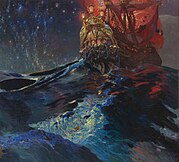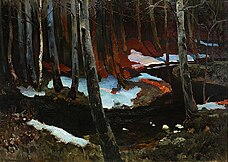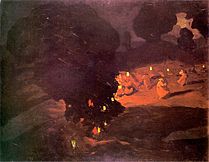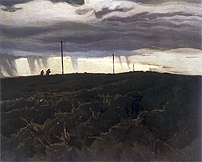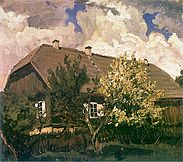Ferdynand Ruszczyc

Ferdynand Ruszczyc (1870–1936) was Polish painter, printmaker, and stage designer. He was a member of the aristocratic Ruszczyc de Lis family.[1][2]
Biography
[edit]
Born in the village of Bohdanów (then Russian Empire, now Belarus), Ruszczyc spent his childhood in Minsk. He graduated from gymnasium in Minsk in 1890 with a gold medal. Ruszczyc originally studied law at the University of St. Petersburg, but later switched majors and began taking painting classes at the Imperial Academy of Arts. He was a student of the famous Russian landscape painters Ivan Shishkin and Arkhip Kuindzhi. Ruszczyc travelled to the Crimea to paint seascapes, and later to the Baltic islands and Sweden to paint northern landscapes. He visited Berlin, where he was significantly influenced by the Symbolist painters such as Arnold Bocklin. After graduation, Ruszczyc made extensive tours of Western Europe incorporating much of the styles he came across into his own art.[3]
Career
[edit]Together with Kazimierz Stabrowski, Xawery Dunikowski, Konrad Krzyżanowski and Karol Tichy, Ruszczyc helped develop the Warsaw School of Fine Arts, where he taught for a while. One of his students was the famous Lithuanian symbolism painter M. K. Čiurlionis. In 1907–08 he held the chair of landscape painting at the Kraków Academy of Fine Arts.
In 1908, with Józef Mehoffer, Ruszczyc organized an exhibition of Polish painting in Vienna. He then settled in Vilna (Vilnius), where he devoted himself to teaching. One of his students of that time was famous Russian and Soviet sculptor Isaac Itkind. Ruszczyc also organized cultural events, and worked as a graphic designer, poster designer and illustrator. As a costume designer, he participated in several performances of the municipal theater, and he was a member of the "Committee for the Conservation of the Adam Mickiewicz Monument". In 1918 and 1919 he participated in the founding of the Faculty of Fine Arts at Stefan Batory University, where he was elected as the first dean.[4][5] Czeslaw Znamierowski was one of his most notable students there.
Selected paintings
[edit]-
Old Apple Trees
-
"Nec Mergitur"
(It will not sink) -
Forest Brook
-
Old House
-
Soil
-
Winter Landscape
-
Mill in Winter
-
Winter Landscape
-
Winter Landscape
-
Coast of Crimea
-
Saturday
-
Emptiness
-
On the Banks of the Wilejka
-
Winter Landscape
-
Sea and Rocks
-
Into the World
-
House in Bohdanow
-
The Old Nest
References
[edit]- ^ Anna Bernat, Ferdynand Ruszczyc, Edipresse Polska, 2007, ISBN 978-83-7477-221-1.
- ^ "Ruszczyc, Ferdynand (1870–1936)". buffalo.edu. Archived from the original on July 4, 2016. Retrieved December 19, 2006.
- ^ "The Land – Ferdynand Ruszczyc". Culture.pl.
- ^ "National Museum in Warsaw, Ferdynand Ruszczyc". culture.pl. Archived from the original on October 6, 2015. Retrieved October 1, 2014.
- ^ "Ferdynand Ruszczyc". Culture.pl.
External links
[edit]![]() Media related to Ferdynand Ruszczyc at Wikimedia Commons
Media related to Ferdynand Ruszczyc at Wikimedia Commons
- 19th-century Polish painters
- 19th-century Polish male artists
- 20th-century Polish painters
- 20th-century Polish male artists
- People from Valozhyn District
- 1870 births
- 1936 deaths
- 20th-century Polish nobility
- Commanders of the Order of Polonia Restituta
- Commanders of the Order of Saint James of the Sword
- Polish male painters
- Painters from the Russian Empire


